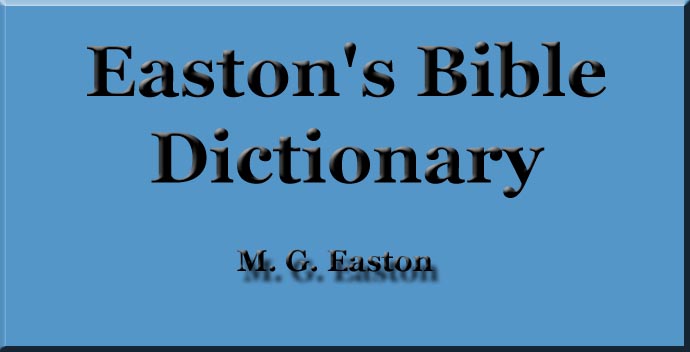

Battlement A parapet wall or balustrade surrounding the flat roofs of the houses, required to be built by a special law (Deu 22:8). In Jer 5:10, it denotes the parapet of a city wall.
Bay Denotes the estuary of the Dead Sea at the mouth of the Jordan (Jos 15:5; Jos 18:19), also the southern extremity of the same sea (Jos 15:2). The same Hebrew word is rendered "tongue" in Isa 11:15, where it is used with reference to the forked mouths of the Nile. BAY In Zac 6:3, Zac 6:7 denotes the colour of horses, but the original Hebrew means strong, and is here used rather to describe the horses as fleet or spirited.
Bay tree Named only in Psa 37:35, Authorized Version. The Hebrew word so rendered is ereh, which simply means "native born", i.e., a tree not transplanted, but growing on its native soil, and therefore luxuriantly. If the psalmist intended by this word to denote any particular tree, it may have been the evergreen bay laurel (Laurus nobilis), which is a native of Palestine. Instead of "like a green bay tree" in the Authorized Version, the Revised Version has, "like a green tree in its native soil."
Bdellium Occurs only in Gen 2:12, where it designates a product of the land of Havilah; and in Num 11:7, where the manna is likened to it in colour. It was probably an aromatic gum like balsam which exuded from a particular tree (Borassus flabelliformis) still found in Arabia, Media, and India. It bears a resemblance in colour to myrrh. Others think the word denotes "pearls," or some precious stone.
Beacon A pole (Heb. to'ren ) used as a standard or ensign set on the tops of mountains as a call to the people to assemble themselves for some great national purpose (Isa 30:17). In Isa 33:23 and Eze 27:5, the same word is rendered "mast." (See BANNER.)
Bealiah Whose Lord is Jehovah, a Benjamite, one of David's thirty heroes of the sling and bow (Ch1 12:5).
Bealoth Citizens, a town in the extreme south of Judah (Jos 15:24); probably the same as Baalath-beer (Jos 19:8). In Kg1 4:16, the Authorized Version has "in Aloth," the Revised Version "Bealoth."
Beam Occurs in the Authorized Version as the rendering of various Hebrew words. In Sa1 17:7, it means a weaver's frame or principal beam; in Hab 2:11, a crossbeam or girder; Kg2 6:2, Kg2 6:5, a cross-piece or rafter of a house; Kg1 7:6, an architectural ornament as a projecting step or moulding; Eze 41:25, a thick plank. In the New Testament the word occurs only in Mat 7:3, Mat 7:4, Mat 7:5, and Luk 6:41, Luk 6:42, where it means (Gr. dokos ) a large piece of wood used for building purposes, as contrasted with "mote" (Gr. karphos ), a small piece or mere splinter. "Mote" and "beam" became proverbial for little and great faults.
Beans Mentioned in Sa2 17:28 as having been brought to David when flying from Absalom. They formed a constituent in the bread Ezekiel (Eze 4:9) was commanded to make, as they were in general much used as an article of diet. They are extensively cultivated in Egypt and Arabia and Syria.
Bear A native of the mountain regions of Western Asia, frequently mentioned in Scripture. David defended his flocks against the attacks of a bear (Sa1 17:34). Bears came out of the wood and destroyed the children who mocked the prophet Elisha (Kg2 2:24). Their habits are referred to in Isa 59:11; Pro 28:15; Lam 3:10. The fury of the female bear when robbed of her young is spoken of (Sa2 17:8; Pro 17:12; Hos 13:8). In Daniel's vision of the four great monarchies, the Medo-Persian empire is represented by a bear (Dan 7:5)